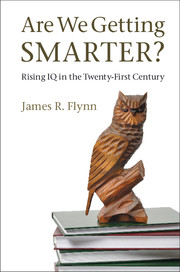Book contents
- Frontmatter
- Contents
- List of Figures
- List of Tables
- List of Boxes
- Acknowledgments
- 1 Opening windows
- 2 IQ and intelligence
- 3 Developing nations
- 4 Death, memory, and politics
- 5 Youth and age
- 6 Race and gender
- 7 The sociological imagination
- 8 Progress and puzzles
- Appendix I IQ trends
- Appendix II Capital cases and comparing the WAIS-III IQs of various nations
- Appendix III Adult/child IQ trends and bright taxes/bonuses
- Appendix IV Gender and Raven’s
- Appendix V Wonderful paper on causes of Raven’s gains
- References
- Subject index
- Name index
4 - Death, memory, and politics
Published online by Cambridge University Press: 05 November 2012
- Frontmatter
- Contents
- List of Figures
- List of Tables
- List of Boxes
- Acknowledgments
- 1 Opening windows
- 2 IQ and intelligence
- 3 Developing nations
- 4 Death, memory, and politics
- 5 Youth and age
- 6 Race and gender
- 7 The sociological imagination
- 8 Progress and puzzles
- Appendix I IQ trends
- Appendix II Capital cases and comparing the WAIS-III IQs of various nations
- Appendix III Adult/child IQ trends and bright taxes/bonuses
- Appendix IV Gender and Raven’s
- Appendix V Wonderful paper on causes of Raven’s gains
- References
- Subject index
- Name index
Summary
Some of the implications of massive IQ gains are clear. IQ scores are deceptive unless adjusted for when the test was normed. Indeed, if we fail to adjust IQs, we will make the execution of capital offenders a lottery in which life and death are decided by what test they happened to take as schoolchildren. Judges are becoming aware of this. It is also becoming evident that the problem with IQ scores is the tip of an iceberg. Other scores, such as those used to measure memory loss, are suspect. Scholars should accept these findings with alacrity. However, learned journals still publish a surprising number of papers that use IQ scores uncritically. Other implications of IQ gains are not clear. For example, has political debate in America become more rational over time?
Death a lottery
The Supreme Court has held, in effect, that a capital offender whose IQ on a reliable test places him in the bottom 2.27 percent of the population has a prima facie case of being exempted from the death penalty. That is the criterion for mental retardation. Ideally, the offender was tested at school prior to the age of 18. But particularly when such scores are not available, or when they seem contradictory, he is tested while on death row.
- Type
- Chapter
- Information
- Are We Getting Smarter?Rising IQ in the Twenty-First Century, pp. 66 - 97Publisher: Cambridge University PressPrint publication year: 2012



